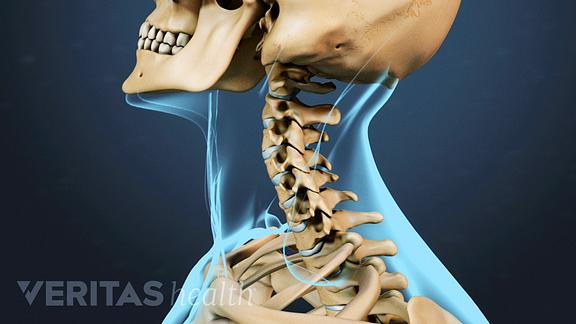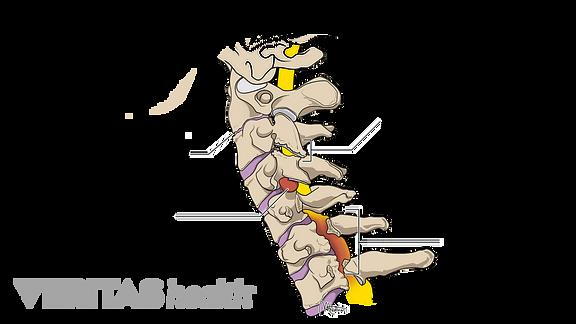
- updated: Apr. 14, 2022
- Neck Pain, Sleeping Tips, Spine Health
When you have a stiff neck, the soreness and restricted range of motion can make routine activities difficult. Symptoms typically last from just a day or two to a couple of weeks, and may be accompanied by a headache, shoulder pain, and/or pain that radiates down your arm. Occasionally when the underlying cause is more serious, the symptoms can last for weeks, months or years. Here are some potential causes of stiff neck, and when it may be something more serious.
See When Is a Stiff Neck Serious?
A stiff neck is commonly caused by a neck muscle strain or soft tissue sprain.
Watch: Neck Strains and Sprains Video
1. Muscle strain
Any activity that places your neck in an awkward position for an extended amount of time could cause neck muscles to become fatigued and spasm. For example, holding your phone against your shoulder while you talk, sleeping with your neck at an awkward angle, carrying a heavy bag on one shoulder, or having to look too far downward or upward to view your computer screen or a TV can all cause neck stiffness.
See Stiff Neck Remedies Based on Cause
Another cause of neck strain is known as text neck, which is neck pain and stiffness caused by spending more and more time looking down at smartphones and tablets.
See How Does Text Neck Cause Pain?
2. Cervical spine disorders
The cervical spine encompasses all of the discs, bones, joints, muscles, and nerves in your neck. Your spinal cord also runs through the center of the vertebrae (bones) in your cervical spine.
Watch: Cervical Spine Anatomy Video
Any one or combination of these parts of your cervical spine may become worn down over time or injured, causing neck stiffness, pain, and/or possible neurological problems. Some cervical spine disorders that commonly occur include:
- Cervical osteoarthritis. Over time, the facet joints in the back of your spine can become arthritic and painful. The facet arthritis, also known as spondylosis, can also encroach on your spinal nerve roots and possibly into the spinal cord area. This may develop in conjunction with various types of spinal degeneration, such as degenerative disc disease, so you may hear your doctor refer to both conditions. Symptoms may include neck pain and stiffness as well as referral pain patterns which refer to pain and stiffness in the shoulder and scapular area. If the spinal nerve roots are involved symptoms may include arm pain and/or tingling, numbness, and possibly difficulty walking if the spinal cord is involved.
- Cervical disc problems. Spinal discs are soft tissue structures that provide cushioning between each vertebra of your spine. Over time, one or more discs in your neck may herniate or degenerate. Like cervical facet arthritis, cervical degenerative disc disease (DDD) may also cause cervical pain and stiffness and is more likely in turn to irritate nerve roots, causing pain and/or tingling, numbness, and possibly difficulty walking if the spinal cord is involved.
Cervical spine disorders must be diagnosed and treated by a qualified health professional. Even if you feel your symptoms are mild, it is a good idea to seek treatment. The right exercise program can go a long way in alleviating neck pain and stiffness or preventing it from getting worse.
See Treatment for a Stiff Neck
A cervical herniated disc, cervical degenerative disc disease, cervical osteoarthritis and cervical spinal stenosis may each cause symptoms of neck stiffness, pain, and/or possible neurological problems.
3. Infection
A stiff neck caused by an infection is rare compared to the other causes above, but it is a serious medical condition. For example, meningitis can cause a stiff neck by infecting and inflaming the meninges, which are the protective membranes surrounding the spinal cord and brain. If you experience fever, headache, nausea, vomiting, or other signs of an infection along with your stiff neck, seek medical attention immediately.
This website includes materials that are protected by copyright, or other proprietary rights. Transmission or reproduction of protected items beyond that allowed by fair use, as defined in the copyright laws, requires the written permission of the copyright owners.







